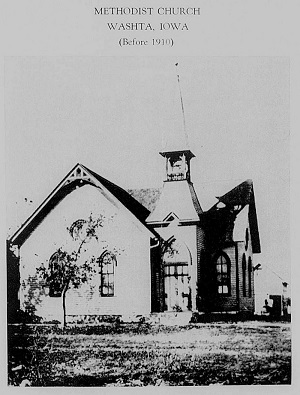|

Click image to enlarge | HISTORY
OF
THE
WASHTA
METHODIST
CHURCH |
As
settlers moved into the Little Sioux Valley to make homes for their
families, so too came the men of God, the Circuit Riders. Preachers
stationed at Smithland and Cherokee first ranged the valley. In 1870 a
church was built in Correctionville and it served a circuit which
included Good Hope, Willow, New Liberty, Fairfield and the Red School
House.
In
1884 Rev. Luce of Correctionville formed a Methodist Class in Washta.
During the years 1885-1888 Cushing and Washta were served by Pastor
Marcus DeLano, Rev. J. A. Goodman and Rev. G. W. Carr. (Rev. Carr later
became President of Morningside College). As the little congregation
grew in number services were held in the Congregational Church and this
continued until 1889.
Rev.
J. L. Whitney became pastor in 1888 and served until 1891. During this
time the dream of a Methodist Church in Washta became a reality and was
incorporated November 13, 1888. The parsonage was purchased and the old
part of the present church was built in 1889. People still living today
cherish fond memories of Rev. Whitney and his family, for much was
accomplished in three communities under his leadership. He organized
the Methodist Class in Quimby, guided that congregation in the building
of their church and contributed much in the spiritual growth of the
Silver Church. His daughter, Mrs. Charles DeGarmo, resides at Early,
Iowa.
During the next ten years Washta ministers served the Silver Church and then the Fairview community.
During
the week of September 6, 1898, the Washta Church held a jubilee which
included a ceremony for the burning of two mortgages amounting to
$1400.00. These services were held in a tent, seating eight hundred
people and there was a choir of thirty voices. We can imagine the joy
of the congregation at having completed so great a task.
In
1911, while Rev. Davies was pastor, the people of the Church felt the
need for more room and the building was raised to accomodate the
construction of the basement rooms as they are today. In 1918 fire
destroyed the Congregational Church building and the two churches
formed a federation that lasted for twenty-five years, being dissolved
in 1943. In 1921 the Silver Church was again served by the Washta
pastor and this arrangement lasted until 1942.
During
the years between 1932 and 1935, Rev. William Bottom and the other
English people of the Church, started our traditional Harvest Festival.
The fruits of the harvest were brought to the Church in a spirit of
thanksgiving to be auctioned off to the highest bidder. Old records
show that those earlier Festivals brought into the Church treasury sums
amounting to about $35.00, but over the years this happy occasion has
changed considerably. Several auctioneers now donate their time and
talent to sell the large amount of produce. People come from all parts
of the county and the 1963 Festival netted $2300.00 to carry on the
work of the Church.
In
1958 the Calf Club was organized and the farmers fed calves to raise
money for the Church. As many as fifty calves were being fed when the
price was high enough to realize a profit, and this project will be
expanded when the market improves. The men enjoy a social hour together
occasionally and are ready and willing to keep the project going.
In
1945 the Church again felt the need for expansion and started a
building fund. The two parsonages were sold at this time. The women of
the WSCS worked long and hard to accomplish their dream of an adequate,
modern kitchen and fellowship hall. Today this goal has been reached
under the able guidence of our beloved pastor, Max Paige, and the
building committee.
There
is not space to tell of all the faithful, loyal workers who have served
the Washta Church from its beginning. However, the name of the Phillip
Zimmerman family is woven through the years. They were here with the
Circuit Riders, caught the vision of the Church and have been faithful
workers through their lives. A daughter, Emma Zimmerman, lives in
Cherokee.
Another
family who has given more than sixty years of devoted service is that
of William Hunter. The family came about the turn of the century and
the value of their contribution cannot be measured in words. It lives
in memory of Sunday-School teacher, sometime-preacher, councelor and
friend. A daughter, Mrs. Ford Ralston, continues, a faithful worker in
the Church today.
(Source:
Commemorative brochure in honor of the church's 80th anniversary. April
1964. Information transcribed and submitted by a volunteer)
|